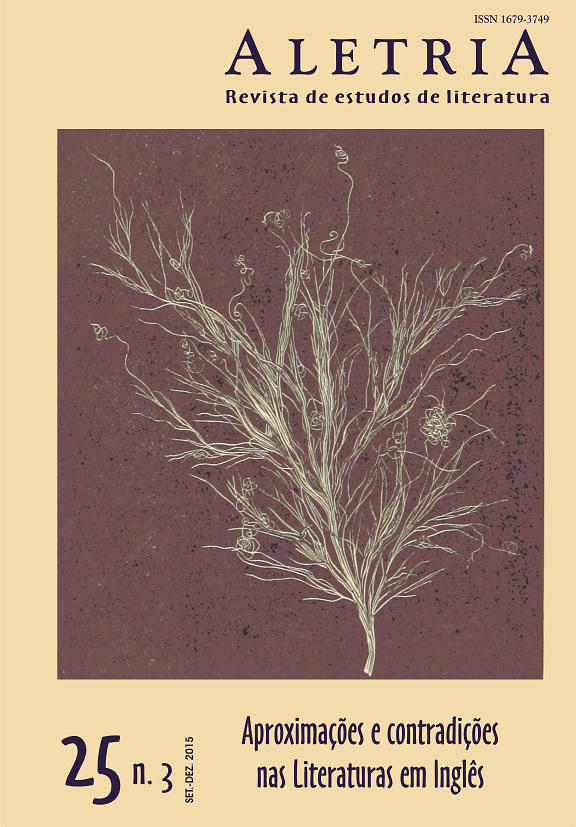A África de Maya Angelou: identidade diaspórica em All God’s Children Need Traveling Shoes
DOI:
https://doi.org/10.17851/2317-2096.25.3.31-48Palavras-chave:
Maya Angelou, África, identidade afro-americanaResumo
O presente artigo objetiva revisar a jornada de Maya Angelou em terras africanas, mediante a releitura crítica de sua narrativa autobiográfica relativa ao período em que viveu em Gana. Partindo de uma perspectiva ampla de análise cultural, o estudo se atenta para a busca identitária da autora afro-americana em sua relação com a África e seus significados. As características da escrita de Angelou são investigadas em paralelo com os temas que motivam sua obra, com o intuito de distinguir sua apropriação do gênero autobiográfico. Sua identidade como sujeito negro diaspórico, que narra suas próprias experiências vividas para além dos históricos limites do colonialismo, revela uma herança africana única que encontra na imaginação criativa um meio de luta cultural.
Downloads
Referências
ANGELOU, Maya. The complete collected poems of Maya Angelou. Nova York: Radom House, 1994.
ANGELOU, Maya. All God’s children need traveling shoes. In: ANGELOU, Maya. The collected autobiographies of Maya Angelou. Nova York: The Modern Library, 2004 [1986]. p. 881-1052.
BHABHA, Homi K. O local da cultura. Trad. Myriam Ávila, Eliana Lourenço de Lima Reis e Gláucia Renate Gonçalves. Belo Horizonte: Editora UFMG, 2010.
ELLIOT, Jeffrey M. (Ed.). Conversations with Maya Angelou. Jackson e Londres: University Press of Mississippi, 1989.
GILROY, Paul. The black Atlantic: modernity and double consciousness. Cambridge: Harvard University Press, 1993.
GOBRY, Ivan. Vocabulário Grego da Filosofia. Trad. Ivone C. Benedetti. São Paulo: Martins Fontes, 2007.
GOMES. “Visíveis e invisíveis grades”: vozes de mulheres na escrita afrodescendente contemporânea. Caderno Espaço Feminino. Uberlândia: EDUFU, v. 12, n. 15, p. 13-26, 2004.
HALL, Stuart. Da diáspora: identidades e mediações culturais. Trad. Adelaine La Guardia Resende et al. Belo Horizonte: Editora UFMG, 2011.
KIERKEGAARD. O conceito de ironia: constantemente referido a Sócrates. Trad. Álvaro Luiz Montenegro Valls. 3. ed. Bragança Paulista: EDUSF, 2006.
LUPTON, Mary Jane. Maya Angelou: a critical companion. Westport: Greenwood Press, 1998.
MCLAREN, Joseph. Alice Walker and the legacy of African American discourse on Africa. In: OKPEWHO, Isidore; DAVIES, Carole Boyce; MAZRUI, Ali A. (Ed.). The African diaspora: African origins and new world identities. Bloomington: Indiana University Press, 2001. p. 525-537.
MCPHERSON, Dolly A. Order out of chaos: the autobiographical works of Maya Angelou. Nova York: Peter Lang, 1990.
PREZIOSI, Donald (Ed.). The art of art history: a critical anthology. Oxford: Oxford University Press, 1998.
SALGUEIRO, Maria Aparecida Andrade. Escritoras negras contemporâneas: estudo de narrativas – Estados Unidos e Brasil. Rio de Janeiro: Caetés, 2004.
SAUNDERS, James Robert. Breaking out of the cage: the autobiographical writings of Maya Angelou. In: BLOOM, Harold (Ed.). Maya Angelou. Nova York: Bloom’s Literary Criticism, 2009. p. 3-15.
SMITHERS, Gregory D. Challenging a Pan-African identity: the autobiographical writings of Maya Angelou, Barack Obama, and Caryl Phillips. Journal of American Studies, Cambridge University Press, p. 1-20, 2011.
THOMPSON, Robert Faris. Flash of the Spirit: African & Afro-American Art & Philosophy. Nova York: Random House, 1984.
THURSBY, Jacqueline S. Critical companion to Maya Angelou: a literary reference to her life and work. Nova York: Facts On File, 2011.
TRAYLOR, Eleanor W. Maya Angelou writing life, inventing literary genre. In: BLOOM, Harold (Ed.). Maya Angelou. Nova York: Bloom’s Literary Criticism, 2009. p. 91-105.
WALL, Cheryl A. Maya Angelou. In: GATES, Jr., Henry Louis; SMITH, Valerie A. (Ed.). The Norton anthology of African American literature. 3. ed. New York: Norton, 2014. p. 944-957.
Downloads
Arquivos adicionais
Publicado
Edição
Seção
Licença
Copyright (c) 2016 Maria Aparecida Andrade Salgueiro, Felipe Fanuel Xavier Rodrigues (Autor)

Este trabalho está licenciado sob uma licença Creative Commons Attribution 4.0 International License.
Autores que publicam nesta revista concordam com os seguintes termos:Autores mantém os direitos autorais e concedem à revista o direito de primeira publicação, com o trabalho simultaneamente licenciado sob a Licença Creative Commons Attribution que permite o compartilhamento do trabalho com reconhecimento da autoria e publicação inicial nesta revista.Autores têm autorização para assumir contratos adicionais separadamente, para distribuição não-exclusiva da versão do trabalho publicada nesta revista (ex.: publicar em repositório institucional ou como capítulo de livro), com reconhecimento de autoria e publicação inicial nesta revista.Autores têm permissão e são estimulados a publicar e distribuir seu trabalho online (ex.: em repositórios institucionais ou na sua página pessoal) a qualquer ponto antes ou durante o processo editorial, já que isso pode gerar alterações produtivas, bem como aumentar o impacto e a citação do trabalho publicado (Veja The Effect of Open Access).














